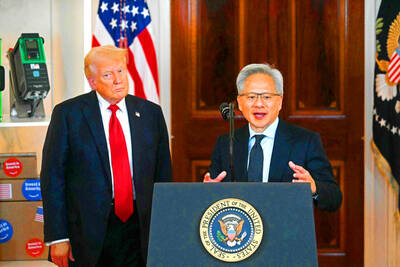The nation’s industrial output contracted 1.8 percent last month from a year earlier as demand for electronics weakened amid a low sales season for technology products and a global economic slowdown, the Ministry of Economic Affairs said yesterday.
The critical economic index fell to 86.15 last month, down 1.8 percent year-on-year and down 19.78 percent month-on-month, Department of Statistics Deputy Director-General Wang Shu-chuan (王淑娟) said, adding that February’s fewer working days also contributed to the decline.
The index might remain soft this month, with a decline of 4 to 7 percent, as demand for smartphones might not pick up until the release of new models in the third quarter, Wang said.
Electronics makers saw output fall 6.14 percent from a year earlier, with sales for chips, flat panels and related components all taking a downturn, the ministry’s report showed.
Wang said that the retreat was the biggest since May 2016, as smartphone sales have been disappointing and the popularity of cryptocurrency mining has subsided, Wang said.
Taiwan Semiconductor Manufacturing Co’s (台積電) manufacturing incident dragged down industrial production. The supplier of chips to Apple Inc’s iPhones cut its quarterly sales forecast last month, citing a shipment of sub-standard chemicals.
Production of optical and computer-related devices bucked the trend with a 25.19 percent increase, as global technology brands upgraded camera lenses and some companies moved China-based production facilities back to Taiwan to avoid tariffs imposed by Washington on Chinese exports, Wang said.
For the first two months of the year, industrial output fell 1.41 percent from a year earlier, affirming signs of economic slowdown at home and abroad, she said.
The development of applications employing 5G technology, artificial intelligence and the Internet of Things might supply a growth catalyst, as the market for smartphones becomes increasingly saturated, Wang said.
Tepid sales extended to the domestic market with commercial sales reporting a 3.3 percent decline in February and retail sales falling by 9.1 percent from a year earlier, the ministry said.
Weak car and motorcycle sales were to blame for low retail figures, as consumers wait for newer models to hit the market, Wang said, adding that retail sales show a positive cyclical movement if car sales are excluded.
Food and beverage sales proved resilient last month with a 0.2 percent increase from a year earlier, despite a relatively high base of comparison, the ministry said, adding that the sector’s sales for January and last month rose 4.7 percent from a year earlier, the ministry said.

Taiwan Semiconductor Manufacturing Co (TSMC, 台積電) last week recorded an increase in the number of shareholders to the highest in almost eight months, despite its share price falling 3.38 percent from the previous week, Taiwan Stock Exchange data released on Saturday showed. As of Friday, TSMC had 1.88 million shareholders, the most since the week of April 25 and an increase of 31,870 from the previous week, the data showed. The number of shareholders jumped despite a drop of NT$50 (US$1.59), or 3.38 percent, in TSMC’s share price from a week earlier to NT$1,430, as investors took profits from their earlier gains

AI TALENT: No financial details were released about the deal, in which top Groq executives, including its CEO, would join Nvidia to help advance the technology Nvidia Corp has agreed to a licensing deal with artificial intelligence (AI) start-up Groq, furthering its investments in companies connected to the AI boom and gaining the right to add a new type of technology to its products. The world’s largest publicly traded company has paid for the right to use Groq’s technology and is to integrate its chip design into future products. Some of the start-up’s executives are leaving to join Nvidia to help with that effort, the companies said. Groq would continue as an independent company with a new chief executive, it said on Wednesday in a post on its Web

CHINA RIVAL: The chips are positioned to compete with Nvidia’s Hopper and Blackwell products and would enable clusters connecting more than 100,000 chips Moore Threads Technology Co (摩爾線程) introduced a new generation of chips aimed at reducing artificial intelligence (AI) developers’ dependence on Nvidia Corp’s hardware, just weeks after pulling off one of the most successful Chinese initial public offerings (IPOs) in years. “These products will significantly enhance world-class computing speed and capabilities that all developers aspire to,” Moore Threads CEO Zhang Jianzhong (張建中), a former Nvidia executive, said on Saturday at a company event in Beijing. “We hope they can meet the needs of more developers in China so that you no longer need to wait for advanced foreign products.” Chinese chipmakers are in

POLICY REVERSAL: The decision to allow sales of Nvidia’s H200 chips to China came after years of tightening controls and has drawn objections among some Republicans US House Republicans are calling for arms-sale-style congressional oversight of artificial intelligence (AI) chip exports as US President Donald Trump’s administration moves to approve licenses for Nvidia Corp to ship its H200 processor to China. US Representative Brian Mast, the Republican chairman of the US House Committee on Foreign Affairs, which oversees export controls, on Friday introduced a bill dubbed the AI Overwatch Act that would require the US Congress to be notified of AI chips sales to adversaries. Any processors equal to or higher in capabilities than Nvidia’s H20 would be subject to oversight, the draft bill says. Lawmakers would have